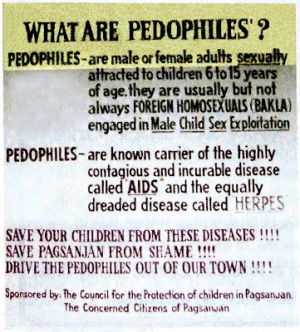Pedophobia
 | ||||||
| NewgonWiki's series on MAP culture war and war of adjacency | ||||||
|---|---|---|---|---|---|---|
|
| ||||||
| "Normalization" | "Groomer" | Trans Kids Validity Policing | Lolicon Debate MAP & LGBT Alliances | Proship Pedophobia | Vigilantism | Moral panic Activist model | Feminism | Queer Ageism | Censorship | Hoax pedophilia Anti | Pro-recovery | Alternative Initialism Transage | Kinky Kids | Assimilationism |
||||||
|
| ||||||
| Template: Adj - This template |

In the context of MAPs, pedophobia is an abnormal and irrational fear of all things related to "pedophilia" (using the broadest possible definition). Since this fear is a social phenomenon, the target is very broad - including irrational disapproval towards representations of teenage bodies, censorship, and antagonism towards acceptance of prevention-oriented mental health and fellowship programs for MAPs. Within a social media context, pedophobia manifests itself as a mental block, where the participant openly states that no amount of evidence will be able to convince them that attraction to minors can be acceptable. This failure to discriminate becomes apparent when anti-pedophiles react identically to anti-contact and pro-c MAPs - demonstrating their dislike owes more to a visceral disgust towards MAPs, than disapproval of their political objectives (see gallery).
Societal and Institution-level Pedophobia
Pedophobia, and its counterpart ageism, can be seen most notably at the societal level - in the form of consent and child pornography laws. Some states also prevent sex offenders from voting, even when other classes of criminal have been given the vote. This disproportionately targets and disenfranchises MAPs.
One example of almost ritualistic pedophobic "purgation" was the congressional condemnation of the Rind et al paper - a work that at no point mentioned the word "pedophile", but provoked multiple accusations of pedophile "propaganda". Institutional pedophobia is also observable in employment and education, with trustees of charities losing their positions, and teachers being fired after suspicions of non-criminal pedophilic orientation, or unfashionable views/statements on the topic (e.g. Mark Miner, Amber Parker, Richard Yuill).
As recently as 2022, the Russian state has produced pedophobic and censorious laws, imposing considerably more punitive fines on "pedophile" apologists than gay propagandists.[1][2] One obvious irony of this scheme of censorship, is that Russia has been accused of forcing hoax pedophilia advocacy into the US.
Consequences
- See also: Special Article: Adverse effects of hysteria.
- Massacres such as the ClubQ mass shooting and Dunblane have resulted directly from the propagation of pedophobia in the media and throughout institutions.
- The glorification of child-hating. This is because the hatred of children might be seen as excusing a person from being labeled a pedophile, particularly in situations where children are exposed to that person. Both Richard Griffiths and Jimmy Savile are known to have resorted to ritualistic expressions of child hating.
- Minors may in some jurisdictions be persecuted for sex acts with other minors, or put into therapy against their will. We have seen examples of aversion therapy and penile plethysmography being used on boys.
- Minors might become anxious about their own attraction to other minors, believing this to be abnormal.
- Minors are never complimented on their appearance, due to social taboos. This may result in poor self-esteem, depression, self-harm and eventually the irrational hatred of MAPs, since they believe minors are meant to be unattractive. This is exacerbated when the person is harboring hebephilic/pedophilic tendencies as they grow up.
- In turn, the resulting stunted and repressed adults deprive the next generation of affection, and the cycle continues.
- Transgenerational transmission of values is made difficult as a result; the young miss mentoring opportunities and life skills that might benefit them in the future.
- We see an increase in involuntary-celibate (incel) males who have internalized sexual neuroses in their childhood, and end up emotionally stunted. Counterintuitively, this contributes to the breakdown of traditional values, family structure and causes demographic decline. Increasingly strict age of consent laws are correlated with declining fertility.
- The young are deprived of sexual pleasures during the time of their life where they are most receptive to it - their teen years. Those who are lucky enough to experience sexual pleasure are limited to inexperienced peers who are often unlearned like them, resulting in sometimes awkward and disappointing experiences.
Stereotypes

There are many pedophobic stereotypes, and their nature may vary according to locality. Often, pedophiles are imagined as basement dwellers, probably IQ <90, overweight or gaunt and rat-like with prescription-type spectacles. They hide behind a computer screen, using crude techniques to entrap the vulnerable.
"Trenchcoat"
The infamous stereotype of a pedophile, with his trenchcoat, sweets in pockets, lurking around bushes in parks/near playgrounds or in a car waiting to lure some child off to kidnap, rape and then murder is one example of pedophobia, generally propagated by the gutter-press.
Brass Eye's (British comedy series) 2001 special edition, casually referred to as Paedogeddon, was a spoof-documentary scripted and in part performed by the reclusive comedian Chris Morris, airing on the UK's Channel 4, that exposed the pedophobic cultural/media trends prevalent at that time. The program was itself attacked in the press, fulfilling the prophecies of the scriptwriter.
"Pedovan"
An extension of the trenchcoat stereotype has been the Pedovan - a popular meme. This is usually a battered Ford Aerostar or similar standard wheelbase commercial, with the words "free candy" scrawled on the side. The interior of the pedovan is a child-pornography studio lined with shagpile carpet, and has a tardis-like quality. The pedovan is used more often to mock the common cliches surrounding child abduction, than as an attack on pedophiles.
Gallery
-
2022 pedophobic United Nations PSA.
-
Anti-c Mapresources.info admin observes deep hatred from anti-pedophiles.
Addressing pedophobic attitudes
A small number of researchers have started to address the topic of stigma against people with an attraction to minors, and how best to counter it.
- Stelzmann, D., Jahnke, S., & Kuhle, L. F. (2022). Media Coverage of Pedophilia and Its Impact on Help-Seeking Persons with Pedophilia in Germany - A Focus Group Study. International Journal of Environmental Research and Public Health 19 (15), DOI: 10.3390/ijerph19159356
- “Media Coverage of Pedophilia and Its Impact on Society
- The low prevalence of pedophilia [1,2,3,4,5] and secret-keeping due to fear of rejection (e.g., [42]) make it unlikely that most people will knowingly have first-hand experiences with individuals with pedophilia. Nevertheless, as previously described, most people have a concept of individuals with pedophilia in their mind which is rather pejorative (e.g., [34]). Based on communication science theories such as the cultivation theory [45,46], it can be assumed that these individual concepts of pedophilia are derived from media coverage since it serves as second-hand experience by informing society about pedophilia. Therefore, persons with pedophilia as well as recipients depend on the media reporting about pedophilia accurately, thus shaping appropriate second-hand experiences [47].
- Media coverage is determined by news factors and/or news values. This means that characteristics such as proximity, damage, or personalization structure the selection of events, and thus certain events are more likely to be reported than others [48,49]. Hence, media reporting on some topics may be biased ([48], also see [47]). To counteract this bias and to protect people who are the subject of media reporting, ethical journalistic standards are established in many countries worldwide [50,51]. [...] However, in the case of pedophilia and pedophilic disorder, comprehensive recommendations are currently lacking. Typical media coverage of pedophilia is characterized by primarily mentioning the subject in the context of severe and current cases of CSA (news factor: damage [48,49]). Thereby, media coverage tends to conflate pedophilia and CSA in the public consciousness [14,15,56,57,58]. For instance, Marc Dutroux, who was found guilty of sexually abusing and killing several children and teenagers in Belgium, was referred to as a “pedophile” in the media, even though his psychological evaluation found that he was not sexually attracted to children, but had other motives for his crimes (e.g., antisocial personality disorder, making profit by selling child sexual exploitation material; [59], also see [60]).”
- Lawrence, A. & Willis, G.M. (2022). Understanding and influencing public attitudes surrounding people with a sexual interest in children. Stigma and Health 7 (3), DOI: 10.1037/sah0000391
- “Previous research indicates that first-person narratives are more effective than informative interventions in reducing stigmatizing attitudes, by way of potentially reversing the process of dehumanization (Harper et al., 2018, 2021; Harper & Hogue, 2015; Jahnke, Philipp, et al., 2015). However, the humanizing narrative intervention in this study was equally effective in increasing pity and reducing negative affective responses, as well as decreasing social distance, deviance, and increasing supportive attitudes as the informative intervention.”
- “Rydell et al. (2007) [...] suggested that the attitudinal shift was a result of the continued accumulation of information influencing the attitudinal process. Indeed, the results from Harper et al. (2021) showed negative affective responses continued and even increased, despite cognitive changes in understanding empirically accurate information regarding sexual interest in children. Similarly, Jara and Jeglic (2021) found psychoeducation intervention increased punitive attitudes within a public sample. Thus, as attitudes regarding people who have these sexual interests have developed over an extended period, it is recommended that future research employ repeated interventions in attempts to promote sustained attitudinal changes.”
- “The process of reversing the effects of stigma has the bifold benefits of enhancing the psychological well-being of people with sexual interest in children and reducing the help-seeking barriers they face.”
See also
- Pedophobic cliches - in literature and TV.
- Vigilantism
External Links
- Pedophobia - BoyWiki.
- Mapmisia - A similar coinage of some social media activists, that avoids the dual-use problem inherent to "pedophobia".

